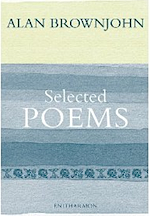The Saner Places: Selected Poems
by Alan Brownjohn
by Alan Brownjohn
On Brownjohn Land.
A Fortnightly Review of
The Saner Places: Selected Poems
by Alan Brownjohn
£10.99 | Enitharmon Press | 60 pages
By Anthony Howell.
THE SEAL AROUND my freezer door has perished. I
ring Smeg, and learn that it is called a gasket, and will cost more than a new
fridge to replace. I feel that I am in Brownjohn Land.
 With so much of his focus on the small vicissitudes of
life rather than on its more grandiose themes, Alan Brownjohn might be the
Giorgio Morandi of contemporary poetry. I cannot help but associate Morandi,
and his humble arrangements of boxes and jars, with the Italian novelist Italo
Svevo. Born some twenty-five years before Morandi, and a friend of James Joyce,
Svevo was part of the modern initiative, yet wrote in a seemingly conservative
narrative style. His subjects, however, are notably devoid of heavy
significance. His Confessions of Zeno is written as the biography of a
man who wishes to put things straight for his analyst, to whom he has gone in an
attempt to give up smoking. The style is decidedly anti-’Beethovenic’ – and the
same could be said for much of the work of this very English poet. Like Morandi
in visual art, Brownjohn occupies an ambiguous position. Is he an ironic
modernist and a metaphysical force, or is he just a throw-back to Betjeman, as
Morandi was a return to figuration?
With so much of his focus on the small vicissitudes of
life rather than on its more grandiose themes, Alan Brownjohn might be the
Giorgio Morandi of contemporary poetry. I cannot help but associate Morandi,
and his humble arrangements of boxes and jars, with the Italian novelist Italo
Svevo. Born some twenty-five years before Morandi, and a friend of James Joyce,
Svevo was part of the modern initiative, yet wrote in a seemingly conservative
narrative style. His subjects, however, are notably devoid of heavy
significance. His Confessions of Zeno is written as the biography of a
man who wishes to put things straight for his analyst, to whom he has gone in an
attempt to give up smoking. The style is decidedly anti-’Beethovenic’ – and the
same could be said for much of the work of this very English poet. Like Morandi
in visual art, Brownjohn occupies an ambiguous position. Is he an ironic
modernist and a metaphysical force, or is he just a throw-back to Betjeman, as
Morandi was a return to figuration?
Certainly he shares certain Slough-like aspects
of the landscape with Betjeman. Eight-a–side railway compartments with no
corridor – such a gift to rapists! And the drab bombsites of the post-war
years providing the footprint for supermarkets. The poet teaches at
prep-schools, or attends office parties where squeakers unroll, but very often
there is a sense of the countryside out there in the dark, or in the background,
a heritage under siege – grumpily expressed in ‘Farmer’s Point of
View’.
I own certain acre-scraps of woodland,
scattered
On undulating ground; enough to lie hidden in. So,
On undulating ground; enough to lie hidden in. So,
About three times a year, and usually
August.
Pairs of people come to one or another patch. They stray
Pairs of people come to one or another patch. They stray
Around the edges first, plainly wanting some
excuse
To go on in; then talking, as if not concerned,
To go on in; then talking, as if not concerned,
And always of something else, not what they
intend.
They find their way, by one or another approach,
They find their way, by one or another approach,
To conducting sexual liaisons – on my land…
